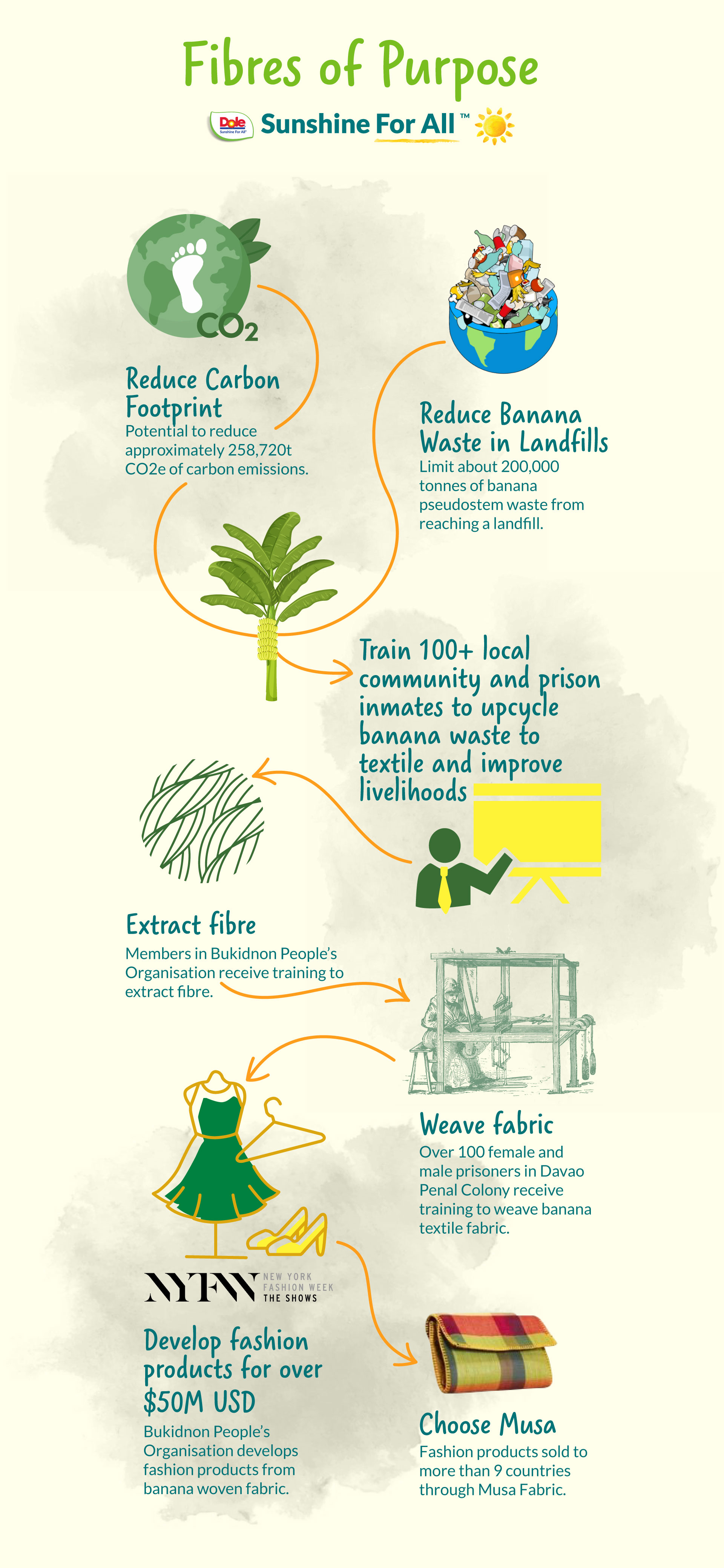Dole New Zealand is proud to partner with House of Musa
Dole New Zealand Turns Banana waste into Fibers of Purpose with Musa Fabric.
Dole New Zealand Turns Banana waste into Fibers of Purpose with Musa Fabric.
Dole’s commitment to sustainability goes beyond providing quality produce all around the globe, with the company putting the planet and their people at the heart of what they do for more than 170 years.
Dole partnered with House of Musa, a fashion brand that creates unique fashion pieces out of banana stem waste, as well as creating jobs in marginalized Filipino communities, especially women.
Dole and House of Musa collaborate to empower inmates and vulnerable women in the Philippines by providing much needed employment and skills. These communities work to extract fibers from otherwise discarded banana stems and use them to weave into sustainable and durable fabric. From this Musa Fabric, House of Musa creates unique and stylish fashion products shown, with the support of Dole, on catwalks in New Zealand and around the world.
The international Dole/MUSA partnership means 200,000 metric tonnes of banana stem waste is stopped from going to landfill, reducing CO2 emissions by more than 250,000 tonnes per annum. In addition to the environmental benefits, choosing Musa Fabric offers economic benefits and has a positive ethical and social impact on communities.
Dole – putting the planet and our people at the heart of what we do.
For more information on the advantages of choosing Musa Fabric
Advantages of choosing Musa Fabric
Environmental Sustainability:
- Waste Reduction: Musa Fabric helps divert banana pseudo-stems, which are usually discarded, from landfills. This reduces waste significantly and helps in lowering the environmental impact associated with waste disposal
- Carbon Footprint: By preventing banana stems from decomposing in landfills, the production of Musa Fabric helps reduce carbon dioxide equivalent emissions, contributing to a reduction in the overall carbon footprint
- Economic Benefits:
- Employment Opportunities: The production of Musa Fabric provides jobs for marginalized communities, , including inmates and also for indigenous people. This not only helps in income generation but also aids in skill development and rehabilitation for the inmates involved in the weaving process
- Community Empowerment: The initiative supports local economies by training community members in sustainable practices and providing them with a steady income stream through the production and sale of Musa Fabric products
- Ethical and Social Impact:
- Empowerment of Marginalized Groups: Musa Fabric production empowers inmates and indigenous women by involving them in the textile production process, providing them with skills and a sense of purpose
- Fair Trade Practices: The project emphasizes fair trade and ethical labour practices, ensuring that workers are fairly compensated and work in humane conditions
- Unique and High-Quality Products:
- Durability and Comfort: Banana fibres are known for their strength and durability, making Musa Fabric products long-lasting and resilient. Additionally, these fibres are breathable and comfortable to wear, making them suitable for various types of clothing and accessories
- Aesthetic Appeal: Musa Fabric offers a unique texture and appearance that sets it apart from conventional fabrics. This uniqueness can add an exclusive and artisanal touch to fashion items
- Alignment with Consumer Preferences:
- Sustainable Fashion Trend: As consumers become more environmentally conscious, there is a growing demand for sustainable fashion. Musa Fabric meets this demand by providing a sustainable and eco-friendly alternative to traditional textiles
- Transparency and Storytelling: Products made from Musa Fabric come with a compelling story of sustainability, social impact, and community support, which resonates with conscious consumers who value transparency and ethical production practices
By choosing Musa Fabric over regular fabrics, you are contributing to a more sustainable and equitable fashion industry while enjoying high-quality, unique, and ethically produced products.

